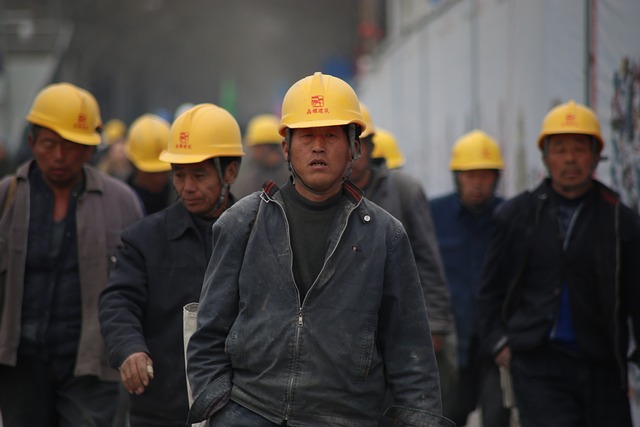FACTORY WORKER JOBS IN USA WITH VISA SPONSORSHIP
If you’re considering applying for a factory job in the United States under sponsorship for a visa, you’ve come to the perfect place. This page aims to provide you with an overview of factory worker positions in the United States, including what is it all about, the average compensation, and instructions on how to apply for a job with a sponsored visa. Who exactly is a factory worker, to begin with?
In factories, workers carry out a variety of tasks. Workers in factories may operate machines to produce various goods. They might also work on product assembly or sort, inspect, and pack things.
This job is available in industrial settings. The canning, beverage and candy processing, dairy processing, pharmaceutical, and leather sectors are a few examples of companies that may hire labor.
In the USA, the average income for a manufacturing worker is $15.94 per hour, or $33,150 per year. The starting salary for entry-level professions is $29,250 annually, while the average salary for experienced workers is $41,164.
10 DUTIES OF A FACTORY WORKER IN USA WITH VISA SPONSORSHIP
A factory worker may have a regular working area or may do a variety of tasks as assigned. Here are some tasks factory workers might do:
1. Manage and keep an eye on equipment.
2. Put items or pieces together and proceed to the next stage.
3. Arrange items, carry out quality inspections to make sure they adhere to requirements, and eliminate faulty items.
4. Examine and choose final goods.
5. Stuff goods into uniform boxes and receptacles for transportation or storage.
6. Keep the area where plants are processed clean and hygienic.
7. Control the temperature and automated processes used in product manufacture.
8. Use a forklift and pallet jack.
9. Keep work environments tidy to adhere to health and safety regulations.
10. Adhere to safety protocols to meet obligations and prevent mishaps.
TYPES OF FACTORY WORKER JOBS IN USA
Here are some typical job types that you might find at a factory:
1. Engineering: Engineers are professionals who design, build, and test machines. Some of them create the products that a factory produces, while others design the machines that a factory uses to create a product. Many engineers spend time at factories observing the production process in order to help them come up with new ideas for developing the products or machines.
2. Assembly: The most prevalent category of factory workers is assembly staff, sometimes known as general laborers. Typically, they handle a single step in the manufacturing process, such joining two toy car components. Basic machinery may be necessary for certain general laborers to help them complete their tasks. A person working in the assembly industry may have different responsibilities based on the type of product they produce and their particular job title.
3. Handling: After ordinary laborers have completed building a product, handling specialists are in charge of it. After the item is finished, they package it appropriately for distribution. This may entail packing the goods into boxes, loading them into trucks, storing them in a distribution center, or moving them around with forklifts or other gear. Some handling professionals may also inspect the packages before delivery.
4. Machine operation: A lot of contemporary companies use a variety of machines to increase the precision and efficiency of the production process. More complex machinery is operated by machinists. They often need particular credentials or on-the-job training before utilizing certain machines, however many start in assembly positions and gain their qualifications while working.
5. Maintenance: Experts in maintenance work to keep factories operating normally. This could involve janitorial workers who keep the factory floor tidy or specialists who maintain and fix the production equipment. There are many different responsibilities, minimal educational requirements, and average pay for this kind of factory work.
6. Health and safety: In order to safeguard employees and lower the number of accidents, factories frequently demand adherence to health and safety laws. Safety experts can assess a facility’s compliance with safety regulations and offer suggestions for enhancing safety protocols. These experts may serve as in-house advisors for a factory or as contractors.
7. Management: Because factories are frequently big work environments, management personnel are necessary to assist with team member supervision and administrative tasks. Managers of factories can supervise employees, place supply orders, and handle payroll and hiring procedures. A manager may be needed for each of the several departments that some larger factories may have.
8. Quality assurance: A quality assurance (QA) specialist verifies that a product produced in a facility satisfies the requirements set forth by the business. Many QA experts evaluate items at the production, while some analyze the product after it is completed or during the design phase. A QA position may need a variety of educational backgrounds, and more credentials may be required for complex or technological items.
What skills are needed to be a factory worker in USA?
physical skills like strength and coordination. the ability to work well with your hands. knowledge of manufacturing production and processes. to be able to carry out basic tasks on a computer or hand-held device.
HOW TO APPLY FOR A FACTORY WORKER JOB IN USA
1. Begin by carefully reading and comprehending the application form’s instructions.
2. Collect all the required paperwork and records, including your resume, identity, contact information, background in school, employment history, and references.
3. Start by accurately entering your personal information in the application form, which should include your full name, address, phone number, and email address.
4. Provide specifics about your prior work experience in the following sections. Provide your job title, dates of employment, the names of the firms you worked for, and a brief summary of your responsibilities.
5. If relevant, give details about your educational background, such as the name of the school you attended, the certification or degree you earned, and the year you finished.
6. Complete any other parts or inquiries about your qualifications for the factory position you’re applying for, such as abilities, licenses, or certificates.
7. Carefully check your application form before submitting it to make sure all the information is correct and comprehensive.
8. As directed on the application form, attach any necessary supporting documentation, such as a cover letter or reference letters.
9. If required, sign and date the application form.
10. Use the approved means, such as online submission, email, or in-person delivery, to submit the completed application form and any supporting papers.



